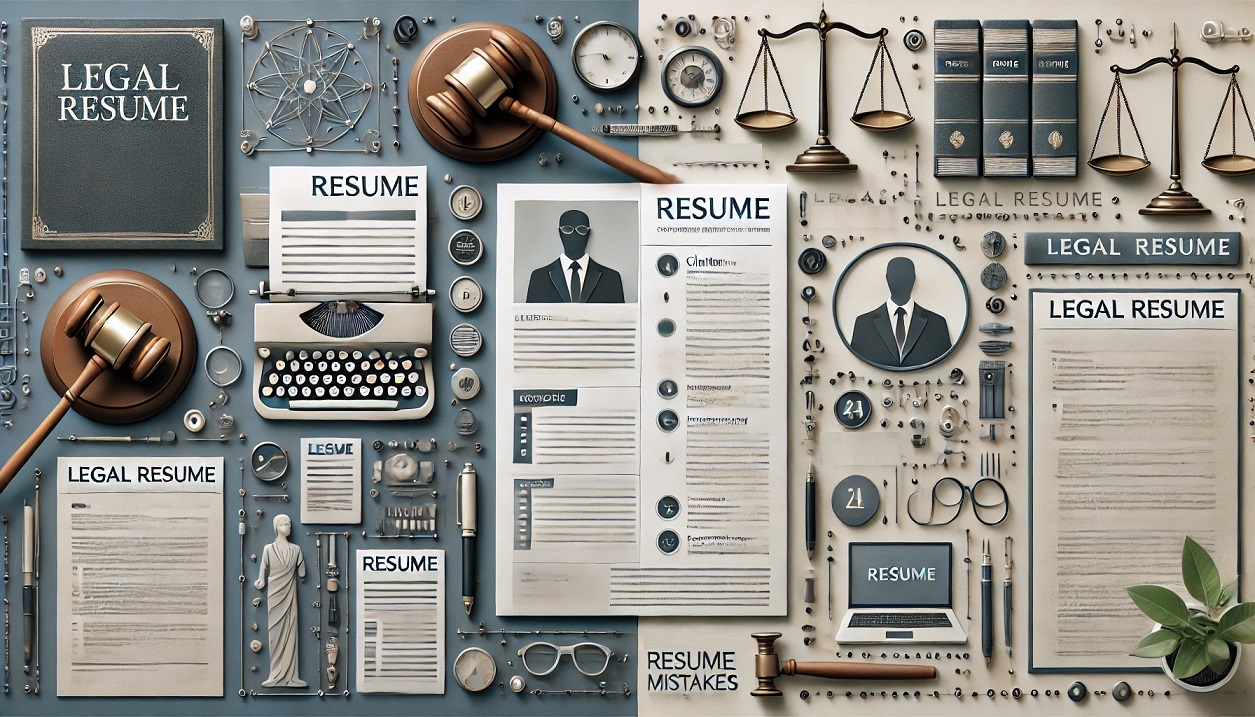
1. Including Too Much Information
One of the most common mistakes attorneys make is overloading their resume with unnecessary details. While it might seem logical to list every role, responsibility, or project you’ve ever handled, this approach can overwhelm the reader and obscure the key points you want to convey. Law firm hiring managers are looking for clear, concise resumes that demonstrate your ability to prioritize information effectively. To ensure your resume is fully refined and error-free, the Attorney Resume Guide to avoid these mistakes offers detailed examples of how to correct and strengthen weak resume sections.
Instead of including every position you’ve held, focus on the experience that is most relevant to the job you are applying for. Tailor your resume to highlight the roles, tasks, and accomplishments that align with the firm's practice areas. For example, if you are applying to a litigation-focused firm, prioritize your trial experience and case outcomes. Cut out any roles or responsibilities that don’t directly contribute to your candidacy for that particular position.
Streamlining your resume helps the hiring manager quickly understand how your experience aligns with their needs and ensures that your most valuable qualifications aren’t lost in a sea of less relevant details. For additional clarity on trimming content, see What Should I Put on My Attorney Resume?.
See Related Articles:
- Should a Resume Be Only One Page Long?
- How Attorneys and Law Students Should Write a Legal Resume: Resume Examples, Suggestions and Resources
- A Complete Guide to Writing an Attorney Resume: Tips, Advice, and the Correct Format
2. Lack of Focus
Another frequent mistake is presenting a resume that lacks focus. Law firms want specialists, not generalists. If your resume covers too many unrelated practice areas, it may give the impression that you haven’t developed deep expertise in any one field. This lack of focus can hurt your chances, as law firms prefer candidates with a clear trajectory and specialization. For strategies to avoid unfocused resumes, check Why Focus Matters: Tailoring Your Legal Resume to Stand Out.
For example, if your resume lists experience in family law, corporate law, and criminal law, it may signal that you haven't honed a specific skill set. Instead, tailor your resume to the position you're applying for by focusing on the most relevant experience. If you're seeking a corporate law position, emphasize your corporate experience and downplay unrelated work. This will show the employer that you understand their needs and have the necessary background to excel in the role. To strengthen your niche positioning, read Why Focus Matters: Tailoring Your Legal Resume to Stand Out.
Discover Opportunities You Won't Find Anywhere Else – Upload Your Resume to BCG Attorney Search.
3. Failing to Prioritize Experience Over Education (for Attorneys with Five or More Years of Experience)
For attorneys who have been practicing for five or more years, law firms are far more interested in your work experience than your educational background. Many candidates make the mistake of placing their education at the top of their resume, even after they have accumulated substantial experience in the field.
Once you have several years of practice under your belt, your resume should prioritize your professional experience over your education. Move your educational background to the bottom of the resume and lead with your most recent legal work. This allows the hiring manager to focus on your accomplishments and the skills you’ve developed in practice, which are far more relevant to the job than your law school grades or extracurricular activities. Avoiding mistakes is critical—but pairing it with strong marketing strategies is even better; see The Kick-Ass Marketing Secret of the Most Successful Candidates and Attorneys for guidance.
By placing your work experience at the forefront, you demonstrate that you have real-world legal skills that can contribute to the firm's success. Your education, while still important, becomes secondary to your achievements in the field. For practical structuring advice, check Crafting an Effective Legal Resume: Essential Advice for Attorneys.
4. Neglecting to Tailor the Resume for Each Job Application
A generic resume is unlikely to get you noticed, especially in the legal profession. Each law firm has specific needs, and your resume should reflect your understanding of the role you are applying for. A resume that isn’t tailored to the position is unlikely to stand out among the competition.
Before submitting your resume, take the time to adjust it for each application. This doesn’t mean rewriting the entire document for every job, but you should modify it to highlight the skills and experience that are most relevant to the firm’s practice areas. For instance, if you're applying for a corporate law position, make sure your resume emphasizes your corporate experience, contracts, mergers, and acquisitions. If you're seeking a litigation role, focus on your courtroom experience, trials, and case outcomes.
Tailoring your resume for each job application shows that you understand the firm's specific requirements and are serious about the position. It also increases your chances of passing the initial resume screening process. For deeper alignment strategies, see The Ultimate Guide to Legal Resume Keywords and Practice Area Targeting.
See Related Articles:
- Harrison Barnes’s 29 Rules to Make Your Resume More Marketable
- How to Perfect Your Legal Resume: 20 Essential Tips for Attorneys and Law Students
- Making the Most of Your Resume
5. Including Personal Information
Another common mistake is including personal information that is irrelevant to your legal career. Law firms are interested in your professional skills and achievements, not your hobbies or extracurricular activities. Personal interests such as “reading,” “sports,” or “volunteering” can make your resume seem unfocused and distract from your qualifications.
Unless a personal interest is directly relevant to the job you’re applying for (e.g., if you are applying to a firm that specializes in sports law and you have a background in athletics), leave it off your resume. Focus solely on your legal experience and accomplishments. Law firms want to see that you are committed to the practice of law and that your resume is tightly focused on your professional achievements. or a breakdown of the most damaging pitfalls, read Top 10 Common Legal Resume Mistakes That Keep You from Getting Hired.
6. Poor Formatting and Structure
The structure and formatting of your resume are just as important as the content. A resume that is cluttered, difficult to read, or poorly organized will likely be passed over, even if you have strong qualifications. Law firm hiring managers often scan resumes quickly, so it’s essential to present your information in a clear, concise, and easy-to-read format.
Use bullet points to break up long blocks of text and make your resume easier to skim. Each section should be clearly labeled, and there should be consistent formatting throughout the document. Avoid using flashy fonts or overly creative designs, as law firms generally prefer a traditional, professional look. Stick to a standard font, such as Times New Roman or Arial, and ensure that your resume is well-organized. If you want to ensure every section is optimized and error-free, the detailed Attorney Resume Guide walks you through best practices used by successful candidates.
By keeping your resume clean and structured, you make it easier for hiring managers to find the information they need quickly. A well-formatted resume reflects professionalism and attention to detail, which are essential qualities in the legal field. To polish presentation and clarity, see How to Perfect Your Legal Resume: 20 Essential Tips for Attorneys and Law Students.
- To avoid these errors entirely, review Key Legal Resume Insights: Comprehensive Answers to Common Resume Challenges for targeted solutions to resume challenges.
Find out what BigLaw firms are really looking for in this free training. Watch It Here
7. Forgetting to Proofread
Typos, spelling mistakes, and grammatical errors are resume killers. Law firms expect their attorneys to have excellent written communication skills, and a resume with errors suggests a lack of attention to detail. Even a small mistake can give the impression that you are careless or unprofessional, which can cost you an interview. To fix these common resume errors fast, the video Five Immediate Changes You Can Make to Your Legal Resume walks through actionable edits that make your resume stand out immediately.
Before submitting your resume, proofread it carefully to catch any errors. Ideally, ask a colleague or mentor to review it as well. Having a second pair of eyes can help you spot mistakes you may have missed. Law firms hold their attorneys to high standards, and your resume should reflect the level of precision and care expected in the legal profession. For recruiter-approved formatting and wording insights, read Attorney Resume and Cover Letter Advice.
- Avoiding mistakes is only half the battle—this killer resume advice for attorneys will show you how to stand out to hiring firms.
To fully maximize your career trajectory, it’s also important to understand how personality and salesmanship influence long-term success in the legal field. For deeper insight, see Transform Your Legal Career: Harnessing Personality and Salesmanship. For an in-depth review of errors attorneys often make, check Legal Resume Mistakes That Sabotage Your Job Search (And How to Fix Them).
See Related Articles:
- Why Focus Matters: Tailoring Your Legal Resume to Stand Out
- Crafting an Effective Legal Resume: Essential Advice for Attorneys
- How to Perfect Your Legal Resume: 20 Essential Tips for Attorneys and Law Students
For a proactive approach that goes beyond avoiding mistakes, see How to Perfect Your Legal Resume: 20 Essential Tips for Attorneys and Law Students.
By avoiding these common legal resume mistakes, you can significantly improve your chances of getting hired. A focused, well-structured resume that highlights your most relevant experience and aligns with the needs of the law firm will help you stand out in a competitive job market. Make sure your resume communicates your qualifications clearly, concisely, and professionally, giving you the best possible chance of securing the job you want. To maximize recruiter appeal, explore Harrison Barnes’s 29 Rules to Make Your Resume More Marketable and prepare for interviews with 50 Essential Law Firm Interview Questions Attorneys Must Master.
Take the Next Step in Your Legal Career – Upload Your Resume to BCG Attorney Search. To see how these tips fit into a real-world framework and why most resumes still fail, read Why Over 85% of Attorney Resumes Are Failing—and How to Fix Yours Now.
1. What are the most common attorney job search mistakes law firms notice on a legal resume?
Answer: Law firms consistently flag unclear practice descriptions, missing deal summaries, and resumes that focus on job duties instead of accomplishments. These issues make it difficult for hiring partners to quickly understand your value. By presenting concrete results and clearly defining your expertise, you immediately stand out. If you need help refining this, BCG Attorney Search offers guidance based on what top firms prioritize.2. How can attorneys improve their legal resume to increase law firm hiring success?
Answer: The strongest resumes are specific, achievement-oriented, and aligned with the needs of the firms you’re targeting. Highlighting measurable wins—such as victories, transactions, or efficiencies you drove—helps hiring partners see your long-term potential. When your resume communicates growth, initiative, and consistent excellence, you naturally rise to the top of the candidate pool.3. Why does tailoring your resume matter in an attorney job search?
Answer: Hiring partners review hundreds of resumes, and those that feel generic or unfocused are immediately overlooked. Tailoring your resume shows intention, focus, and an understanding of what the firm actually needs. This simple step demonstrates professionalism and greatly increases your chances of securing interviews. For individualized targeting advice, attorneys often rely on BCG Attorney Search.4. Should attorneys list every case or deal when preparing for a lateral move?
Answer: No—your lateral move resume should focus on the matters that best illustrate your capabilities, specialty, and progression. Too much detail overwhelms readers, while strategically curated highlights show depth without sacrificing clarity. Emphasize matters that reflect the work you want to continue doing, not just the work you’ve already done.5. Can working with a legal recruiter help attorneys fix resume mistakes and accelerate career growth?
Answer: A specialized legal recruiter provides insight into what specific firms look for and can help reshape your resume to meet those expectations. Recruiters also understand market trends and can position your strengths to maximize lateral opportunities. This kind of targeted guidance often shortens the job search and leads to stronger results. Explore opportunities and personalized support through BCG Attorney Search to move your career forward.About Harrison Barnes
No legal recruiter in the United States has placed more attorneys at top law firms across every practice area than Harrison Barnes. His unmatched expertise, industry connections, and proven placement strategies have made him the most influential legal career advisor for attorneys seeking success in Big Law, elite boutiques, mid-sized firms, small firms, firms in the largest and smallest markets, and in over 350 separate practice areas.
A Reach Unlike Any Other Legal Recruiter
Most legal recruiters focus only on placing attorneys in large markets or specific practice areas, but Harrison places attorneys at all levels, in all practice areas, and in all locations-from the most prestigious firms in New York, Los Angeles, and Washington, D.C., to small and mid-sized firms in rural markets. Every week, he successfully places attorneys not only in high-demand practice areas like corporate and litigation but also in niche and less commonly recruited areas such as:
- Immigration Law
- Workers Compensation
- Insurance
- Family Law
- Trust and Estate
- Municipal law
- And many more...
This breadth of placements is unheard of in the legal recruiting industry and is a testament to his extraordinary ability to connect attorneys with the right firms, regardless of market size or practice area.
Proven Success at All Levels
With over 25 years of experience, Harrison has successfully placed attorneys at over 1,000 law firms, including:
- Top Am Law 100 firms such including Sullivan and Cromwell, and almost every AmLaw 100 and AmLaw 200 law firm.
- Elite boutique firms with specialized practices
- Mid-sized firms looking to expand their practice areas
- Growing firms in small and rural markets
He has also placed hundreds of law firm partners and has worked on firm and practice area mergers, helping law firms strategically grow their teams.
Unmatched Commitment to Attorney Success - The Story of BCG Attorney Search
Harrison Barnes is not just the most effective legal recruiter in the country, he is also the founder of BCG Attorney Search, a recruiting powerhouse that has helped thousands of attorneys transform their careers. His vision for BCG goes beyond just job placement; it is built on a mission to provide attorneys with opportunities they would never have access to otherwise. Unlike traditional recruiting firms, BCG Attorney Search operates as a career partner, not just a placement service. The firm's unparalleled resources, including a team of over 150 employees, enable it to offer customized job searches, direct outreach to firms, and market intelligence that no other legal recruiting service provides. Attorneys working with Harrison and BCG gain access to hidden opportunities, real-time insights on firm hiring trends, and guidance from a team that truly understands the legal market. You can read more about how BCG Attorney Search revolutionizes legal recruiting here: The Story of BCG Attorney Search and What We Do for You.
The Most Trusted Career Advisor for Attorneys
Harrison's legal career insights are the most widely followed in the profession.
- His articles on BCG Search alone are read by over 150,000 attorneys per month, making his guidance the most sought-after in the legal field. Read his latest insights here.
- He has conducted hundreds of hours of career development webinars, available here: Harrison Barnes Webinar Replays.
- His placement success is unmatched-see examples here: Harrison Barnes' Attorney Placements.
- He has created numerous comprehensive career development courses, including BigLaw Breakthrough, designed to help attorneys land positions at elite law firms.
Submit Your Resume to Work with Harrison Barnes
If you are serious about advancing your legal career and want access to the most sought-after law firm opportunities, Harrison Barnes is the most powerful recruiter to have on your side.
Submit your resume today to start working with him: Submit Resume Here
With an unmatched track record of success, a vast team of over 150 dedicated employees, and a reach into every market and practice area, Harrison Barnes is the recruiter who makes career transformations happen and has the talent and resources behind him to make this happen.
A Relentless Commitment to Attorney Success
Unlike most recruiters who work with only a narrow subset of attorneys, Harrison Barnes works with lawyers at all stages of their careers, from junior associates to senior partners, in every practice area imaginable. His placements are not limited to only those with "elite" credentials-he has helped thousands of attorneys, including those who thought it was impossible to move firms, find their next great opportunity.
Harrison's work is backed by a team of over 150 professionals who work around the clock to uncover hidden job opportunities at law firms across the country. His team:
- Finds and creates job openings that aren't publicly listed, giving attorneys access to exclusive opportunities.
- Works closely with candidates to ensure their resumes and applications stand out.
- Provides ongoing guidance and career coaching to help attorneys navigate interviews, negotiations, and transitions successfully.
This level of dedicated support is unmatched in the legal recruiting industry.
A Legal Recruiter Who Changes Lives
Harrison believes that every attorney-no matter their background, law school, or previous experience-has the potential to find success in the right law firm environment. Many attorneys come to him feeling stuck in their careers, underpaid, or unsure of their next steps. Through his unique ability to identify the right opportunities, he helps attorneys transform their careers in ways they never thought possible.
He has worked with:
- Attorneys making below-market salaries who went on to double or triple their earnings at new firms.
- Senior attorneys who believed they were "too experienced" to make a move and found better roles with firms eager for their expertise.
- Attorneys in small or remote markets who assumed they had no options-only to be placed at strong firms they never knew existed.
- Partners looking for a better platform or more autonomy who successfully transitioned to firms where they could grow their practice.
For attorneys who think their options are limited, Harrison Barnes has proven time and time again that opportunities exist-often in places they never expected.
Submit Your Resume Today - Start Your Career Transformation
If you want to explore new career opportunities, Harrison Barnes and BCG Attorney Search are your best resources. Whether you are looking for a BigLaw position, a boutique firm, or a move to a better work environment, Harrison's expertise will help you take control of your future.
Submit Your Resume Here to get started with Harrison Barnes today.
Harrison's reach, experience, and proven results make him the best legal recruiter in the industry. Don't settle for an average recruiter-work with the one who has changed the careers of thousands of attorneys and can do the same for you.
About BCG Attorney Search
BCG Attorney Search matches attorneys and law firms with unparalleled expertise and drive, while achieving results. Known globally for its success in locating and placing attorneys in law firms of all sizes, BCG Attorney Search has placed thousands of attorneys in law firms in thousands of different law firms around the country. Unlike other legal placement firms, BCG Attorney Search brings massive resources of over 150 employees to its placement efforts locating positions and opportunities its competitors simply cannot. Every legal recruiter at BCG Attorney Search is a former successful attorney who attended a top law school, worked in top law firms and brought massive drive and commitment to their work. BCG Attorney Search legal recruiters take your legal career seriously and understand attorneys. For more information, please visit www.BCGSearch.com.
Harrison Barnes does a weekly free webinar with live Q&A for attorneys and law students each Wednesday at 10:00 am PST. You can attend anonymously and ask questions about your career, this article, or any other legal career-related topics. You can sign up for the weekly webinar here: Register on Zoom
Harrison also does a weekly free webinar with live Q&A for law firms, companies, and others who hire attorneys each Wednesday at 10:00 am PST. You can sign up for the weekly webinar here: Register on Zoom
You can browse a list of past webinars here: Webinar Replays
You can also listen to Harrison Barnes Podcasts here: Attorney Career Advice Podcasts
You can also read Harrison Barnes' articles and books here: Harrison's Perspectives
Harrison Barnes is the legal profession's mentor and may be the only person in your legal career who will tell you why you are not reaching your full potential and what you really need to do to grow as an attorney--regardless of how much it hurts. If you prefer truth to stagnation, growth to comfort, and actionable ideas instead of fluffy concepts, you and Harrison will get along just fine. If, however, you want to stay where you are, talk about your past successes, and feel comfortable, Harrison is not for you.
Truly great mentors are like parents, doctors, therapists, spiritual figures, and others because in order to help you they need to expose you to pain and expose your weaknesses. But suppose you act on the advice and pain created by a mentor. In that case, you will become better: a better attorney, better employees, a better boss, know where you are going, and appreciate where you have been--you will hopefully also become a happier and better person. As you learn from Harrison, he hopes he will become your mentor.
To read more career and life advice articles visit Harrison's personal blog.






